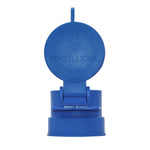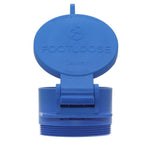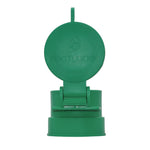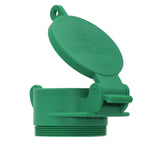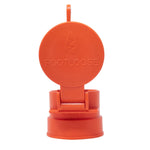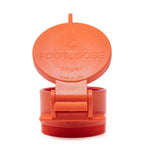You have no items in your shopping cart.
RV life may be vastly different than living in a regular home, but that doesn’t mean the RV lifestyle will cause you to forego the luxuries of watching television or using plug-in appliances. If you’re a full-time RVer who camps or boondocks often, it may be worth looking into installing solar panels onto your motorhome.
Solar powering your motorhome offers an eco-friendly option to use electronics and appliances while out on the road. In this article, we’ll explain how to use solar power in your RV while camping or boondocking.
How Do RV Solar Panels Work?
Solar panel systems are a useful addition to any RV, especially if you’re going to spend the majority of your time camping or boondocking. These panels are usually placed on the roof of your RV, where they can absorb energy from the sunlight that hits their cells. This energy is then converted into an electrical current, which is transferred through wires toward a charge controller.
The energy absorbed becomes direct current electricity, which charges your RV’s batteries to power devices, appliances, and anything else that uses electricity. This way, you can have working lights, a TV, and a running refrigerator from anywhere on the road!
Tips for Using Solar Power in Your RV
Powering your RV with solar panels is a great way to support clean, renewable energy while also benefiting yourself by having access to power anywhere on the road. Here are some tips that you can take into consideration when installing solar panels onto your RV.
-
Start Off Small
When you begin installing solar panels on your RV, consider how many you’ll need at first. Buying too many at once can be costly and unnecessary, especially if you are only going to use a select amount. Take a look at what you will be powering on a daily basis, such as televisions, laptops, and kitchen appliances, then calculate how much power you’ll consume on an average day. To help offset your energy usage, it may be best to start small by powering your non-essential electronics or using a solar water heater.
-
Compare Prices
If installing solar panels on your RV is something you want to do, you’ll need to think about whether this project is within your general budget. Fortunately, there are ways to make solar power less expensive by limiting your energy usage. For instance, if you wish to run only smaller electronics like a laptop, you may be able to get away with a 400-watt system for only $3,500 to $4,500. However, you’ll still need to purchase a generator to power your refrigerator.
An 800-watt system for $4,000 to $6,000 could power small appliances like a coffee maker, but you’ll likely still need a generator for larger appliances. If you want a comprehensive solar system that powers literally everything under the sun, including the refrigerator, microwave, and air conditioner, you’ll be looking at a 1200-watt system that costs upwards of $10,000.

-
Consider the Shape of Your Panels
RV solar panels come in two shapes: curved or flat. Curved solar panels are aerodynamic. However, due to their shape, they can’t be tilted toward spots that capture the most sun. They are also lighter and can be placed smoothly around the body of your RV.
Flat solar panels are the other option. They are more durable and far less expensive than curved ones. These solar panels can also capture more sunlight, as they can be placed in locations and spots where the sun is most powerful, providing more efficient energy.
-
Invest in a Sufficient Battery
Most solar systems require a battery to help collect energy from the sun. The battery does most of the work, which means it’s important to invest in one that is going to function effectively and last a long time. Usually, it’s better to go with a larger battery that can last for at least 3-4 days at a time without recharging. That way, if a time comes when you have cloud cover and no access to a recharging station, you’ll still have power stored for days to come.
-
Don’t Forget About Converters
Once you’re done setting up your solar system, you’ll need to find ways to maintain your batteries and keep everything running smoothly. A great way to do this is to avoid overcharging your batteries. You can achieve this by purchasing a solar charge controller to regulate the power transferring from the panels to your battery storage.
To make your appliances run, you may also need to purchase a power inverter. A power inverter converts the DC power generated by solar to household AC power. Ensure that all systems – batteries, solar panels, and converters – are compatible with each other in terms of difference in voltage to guarantee everything runs smoothly.
Frequently Asked Questions
In the beginning, it can be intimidating to learn how solar panels work and how to install them on your RV. To help cure some of your curiosities surrounding RV solar panels, here are some commonly asked questions within the RV community.
How do I calculate how many solar panels I need?
First, you’ll want to make a list of all the appliances and devices that will need power from your solar system. From this list, add up all the watts that you estimate will be used on a daily basis. An average RV uses 4 - 15 kWh per day. Remember that some days, you may use less or more energy or have less sunlight.
Generally, it is recommended to purchase sparingly until you have enough energy to power your devices. Begin with a one- or two-panel system and see if it’s enough. If not, continue adding panels until you’ve reached your desired power, keeping in mind how much your charge controller can handle.
Can you run an RV completely on solar power?
RVs may be able to run completely on solar power, but this may end up being more costly to install and maintain. Most RVers use solar panels to power their lights, television, and other small appliances and an AC generator to power their refrigerator and air conditioner.
Can I connect solar panels directly to the RV battery?
Solar panels can be connected directly to an RV’s battery. However, this can prove inefficient and could even damage the battery. To prevent this, connect the battery and solar panel to a solar charge controller, which is highly recommended as the safest option for charging batteries with your solar panel.
Is It Worth Getting RV Solar Panels?
Depending on the type of lifestyle you lead on the road, installing solar panels on your RV can be a worthwhile investment, especially for the environment. If you’d like to learn more about traveling green in an RV, check out our blog on the new concepts in eco-friendly motorhomes.



